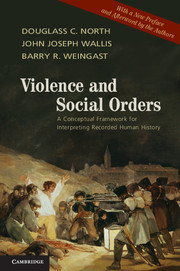Book contents
- Frontmatter
- Contents
- Preface
- Acknowledgments
- 1 The Conceptual Framework
- 2 The Natural State
- 3 The Natural State Applied: English Land Law
- 4 Open Access Orders
- 5 The Transition from Limited to Open Access Orders: The Doorstep Conditions
- 6 The Transition Proper
- 7 A New Research Agenda for the Social Sciences
- References
- Index
4 - Open Access Orders
Published online by Cambridge University Press: 17 August 2009
- Frontmatter
- Contents
- Preface
- Acknowledgments
- 1 The Conceptual Framework
- 2 The Natural State
- 3 The Natural State Applied: English Land Law
- 4 Open Access Orders
- 5 The Transition from Limited to Open Access Orders: The Doorstep Conditions
- 6 The Transition Proper
- 7 A New Research Agenda for the Social Sciences
- References
- Index
Summary
Introduction
Although open access orders are far more peaceful than natural states, social scientists take this peace for granted. No models explain why violence is generally absent, whether in the form of coups, riots, rebellions, or civil wars. These societies are Weberian: the government holds a monopoly on the legitimate use of violence, which is subject to clear and well-understood rules. In open access orders, political and social arrangements identify a set of military and police organizations that can legitimately use violence and a set of political organizations that control the use of violence by the military and police. Control of the government, in turn, is contestable and is subject to clear and well-understood rules.
Open access orders exhibit a virtuous circle linking the control of violence and open access. The political system limits access to the means of violence; open economic and social access ensures that access to the political system is open; credible prohibitions on the use of violence to compete maintains open economic and social access; and political and judicial systems enforce prohibitions on the use of violence. Similarly, open access to organizations in all systems sustains competition in all systems. Competition in all systems, in turn, helps sustain open access.
Standard views about how developed societies operate and sustain themselves typically focus on one system, either markets or democracy, without considering the other. Economics takes open access as given and explores its consequences; explanations for market stability usually focus on the equilibrium properties of the economy.
- Type
- Chapter
- Information
- Violence and Social OrdersA Conceptual Framework for Interpreting Recorded Human History, pp. 110 - 147Publisher: Cambridge University PressPrint publication year: 2009



